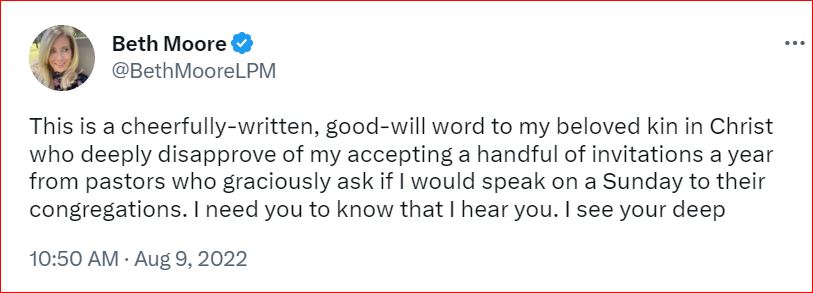-----------------------
Some more false and superficial teaching from Ms. Prata. Frankly, we have a hard time understanding how someone can so poorly understand the Scriptures and still be regarded as a teacher. Not only that, she calls herself a "Discernment Minister."
Ms. Prata simply parrots the party line about the issue of women teachers. She adds no new information, insight, or even attempts to persuade.
Some more false and superficial teaching from Ms. Prata. Frankly, we have a hard time understanding how someone can so poorly understand the Scriptures and still be regarded as a teacher. Not only that, she calls herself a "Discernment Minister."
Ms. Prata simply parrots the party line about the issue of women teachers. She adds no new information, insight, or even attempts to persuade.
It's a waste of time.
-------------------
1 Corinthians 14:34-35 says
The women are to keep silent in the churches, for they are not permitted to speak, but are to subject themselves, just as the Law also says. But if they desire to learn anything, let them ask their own husbands at home, for it is disgraceful for a woman to speak in church.
It’s very clear. Women are not to preach, or teach men, (but I do not allow a woman to teach or exercise authority over a man, but to remain quiet says 1 Timothy 2:12.) (We just completed a post that thoroughly examines this false claim.)
As Larry Farlow said of the 1 Timothy verse:
@LarryFarlow: Yep. If someone cannot teach or exercise authority over half the church, they can’t be a pastor. (Biblically speaking, pastors are not the heads of churches. And teaching is not exercising authority. Mr. Farlow is completely wrong.)
And, using the word speak instead of preach is not the ‘get out of jail’ card rebellious women think it is. (Sigh. Ms. Prata just rattles of words irrespective of what they mean. They are not interchangeable.
1 Corinthians 14:34-35 says
The women are to keep silent in the churches, for they are not permitted to speak, but are to subject themselves, just as the Law also says. But if they desire to learn anything, let them ask their own husbands at home, for it is disgraceful for a woman to speak in church.
It’s very clear. Women are not to preach, or teach men, (but I do not allow a woman to teach or exercise authority over a man, but to remain quiet says 1 Timothy 2:12.) (We just completed a post that thoroughly examines this false claim.)
As Larry Farlow said of the 1 Timothy verse:
@LarryFarlow: Yep. If someone cannot teach or exercise authority over half the church, they can’t be a pastor. (Biblically speaking, pastors are not the heads of churches. And teaching is not exercising authority. Mr. Farlow is completely wrong.)
And, using the word speak instead of preach is not the ‘get out of jail’ card rebellious women think it is. (Sigh. Ms. Prata just rattles of words irrespective of what they mean. They are not interchangeable.
- "Preach" (kérussó) refers to preaching the Gospel...
- "Teach" (didaskó) nearly always refers to teaching the Scriptures (the written Word of God)...
Preaching and teaching need to be clearly delineated. For example:
Mt. 4:23 Jesus went throughout Galilee, teaching in their synagogues, preaching the good news of the kingdom, and healing every disease and sickness among the people.
Jesus spoke in two distinct ways here, preaching and teaching. He taught biblical knowledge (didaskó), and He preached the Gospel (kérussó). The two are not the same. We shall not allow Ms. Prata to substitute and conflate words that have various meanings.
It's this amateurish approach that dismays us, because Ms. Prata represents herself as a teaching resource for women.)
The Greek word in the verse literally means speak. (No, the word "teach" in 1 Timothy 2:12 is didaskó. The word "speak" in 1 Corinthians 14:34-35 is laleó. the two words are not the same.
But more to the point, Paul's 1 Corinthians 14:34-35 admonition about women speaking is context-specific. There was an issue in the Corinthian church with women speaking out of order. This was disruptive behavior, so Paul commanded that women not speak up but rather ask their questions to their husbands at home.
If women were to be absolutely silent in church at all times, that would an odd thing. We are pretty sure Ms. Prata converses with friends in church. Further, in 1 Corinthians 11:5 Paul tells about women praying prophesying with their heads covered. So women were in fact speaking in church. If Ms. Prata doubts this, Paul would reprimand her:
1Co. 11:16 If anyone wants to be contentious about this, we have no other practice — nor do the churches of God.)
So when someone like Beth Moore coyly claims to be “speaking” on Mother’s Day, when she is actually preaching, it’s a double rebellion and thus doubly hypocritical because she tried to cover it up.

Changing “preaching” to “doing” doesn’t fool God. Or anybody else.

The Corinthian church was having special problems with disorders in their public meetings (1 Cor. 11:17–23). The reason is not difficult to determine: they were using their spiritual gifts to please themselves and not to help their brethren. The key word was not edification, but exhibition. If you think that your contribution to the service is more important than your brother’s contribution, then you will either be impatient until he finishes, or you will interrupt him. Add to this problem the difficulties caused by the “liberated women” in the assembly, and you can understand why the church experienced carnal confusion.” Wiersbe, W. W. (1996). The Bible exposition commentary (Vol. 1, pp. 614–615). Victor Books.
Ladies, do you “speak” in church to the congregation? Even if the Sunday School or Bible study leader teacher asks for comment, are you the first to leap in and state your opinions? If so, do you believe what you have to say is more important, more edifying than what the man next to you would say, if he could get a word in edgewise?
Yes, Paul was speaking of disorder in the church, when women who had not even been allowed in the synagogue but had to stand behind a partition if they wanted to hear, now allowed not only in the church but to pray and prophesy (before the canon was closed), (Wow, Ms. Prata swerves into the truth for about 2 seconds, and swerves right back out. She admits that 1 Corinthians 14:34-35 is not a general prohibition about women speaking in church [praying and prophesying], but then she drags in the canon being closed. Why? Does she mean that women can't speak in church now because the canon is closed?
Of course, the closed canon has nothing to do with prophesy. And there is nothing in this or any Scripture that forbids a woman to speak in church.)
caused a melee of chaos. Paul wanted it stopped.
But though Paul was speaking of a certain situation in history, it does not mean all is OK now. The tendency for women to usurp is still present in us. When Paul said women are not to teach or have authority in the church, (1 Timothy 2:12 does not contain the phrase "in the church," nor does it use the word "women.")
he followed that up in the next verse by appealing to the creation order. The creation order Paul appealed to still stands. Men lead the church. Women do not. (1 Timothy 2:12 is not about men leading the church.)
Women are to listen, learn, and submit to their elders and their teaching. (True, 1 Timothy 2:12 but does not contain this information.
That's three false claims about 1 Timothy 2:11 in a row. So let's quote it:
1Ti. 2:12 I do not permit a woman to teach or to have authority over a man; she must be silent.
"A woman" is not allowed to teach or have authority over "a man." Nothing about church, elders, or women preaching in church.)
Yet there are so many ministries women are allowed to and even commanded in which to participate. Of course we share the Gospel, that’s for all of us to do. ("Preaching," kérussó.)
We are hospitable, we support our husbands, we teach women, we teach children, we can help with administering finances, or preparing budgets, we have gifts of mercy and helps… Egalitarian women today make it seem as though if we cannot teach or preach, we’re good for nothing.
Not so. Feminists and egalitarians are eternally discontent. But we find contentment in what the Lord has prepared for us, within His boundaries.
I appeal to you sisters, if you have an unhealthy and unbiblical desire to continually speak in church, in any way, before the gathered, please reconsider. Let the men speak. Listen, pray, sit attentively, to the glory of God and do not be a disgrace.
Not so. Feminists and egalitarians are eternally discontent. But we find contentment in what the Lord has prepared for us, within His boundaries.
I appeal to you sisters, if you have an unhealthy and unbiblical desire to continually speak in church, in any way, before the gathered, please reconsider. Let the men speak. Listen, pray, sit attentively, to the glory of God and do not be a disgrace.
No comments:
Post a Comment